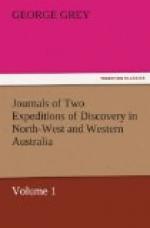The northern banks of Prince Regent’s River I conceive to offer no inducement whatever for the formation of a settlement, the whole of the country in that direction, as far as I have seen, consisting entirely of sandstone ridges. These ridges are continually intersected by valleys, or rather ravines of great fertility, but they are so narrow, and the good land contained in them is so very limited in extent, that from the first moment of the establishment of a colony here the individuals composing it must necessarily be scattered over a large space of country. They would thus be separated from one another by considerable intervals, which separation would not only render them more liable to disagreements with the natives, but would for many other reasons be highly detrimental to the interests of an infant colony.
The same objection holds good with regard to the south bank of this river, as far as the longitude of 125 degrees 3 minutes east, and even after passing this point the land immediately bordering the river is of the same sterile character; however a creek which trends nearly south runs up from thence into one of the most fertile countries I have ever seen.
HARBOURS.
The coastline to the south of Prince Regent’s River is indented, as shown upon Captain King’s chart, by numerous deep bays, many of which afford excellent anchorage; indeed I believe that there is no other part of the world in which an example occurs of three such fine harbours as Port George the Fourth, Hanover Bay, and Camden Sound, lying so close to one another.
These harbours alone render this a point of considerable consequence to Great Britain; but when viewed in connexion with the fine tract of country lying behind them its importance is very materially increased.
COMMERCIAL ADVANTAGES.
Should this part of Australia be found eligible for colonization its commercial importance is well worthy of consideration.
PRODUCTIONS SUITED FOR CULTIVATION. COTTON TRADE.
The cultivated productions for the growth of which the country and climate seem best adapted are cotton, sugar, indigo, and rice.
A species of cotton plant grows wild in the greatest abundance, and if a colony was established and the proper cotton-plant introduced the following advantages would be obtained:
Great Britain would possess in Northern Australia a colony standing in the same relation to her manufacturies for cotton that her colonies in the south do to her wool-market.
This colony would also form a sort of entrepot to which the manufactured cotton would again be exported for the purpose of sale in the islands of the Indian Archipelago or its vicinity, and other parts where we have at present no trade, and where printed cottons now are, and from the nature of these countries must constantly be, in great demand.
Thus a fresh supply of cotton for our markets would be obtained, which, coming from an English colony, would give employment to British vessels alone, and the industry of our manufacturers would be called into operation by an entirely new market for cotton goods being thrown open to them, in which the demand for these articles is far greater than the supply could be for many years.




